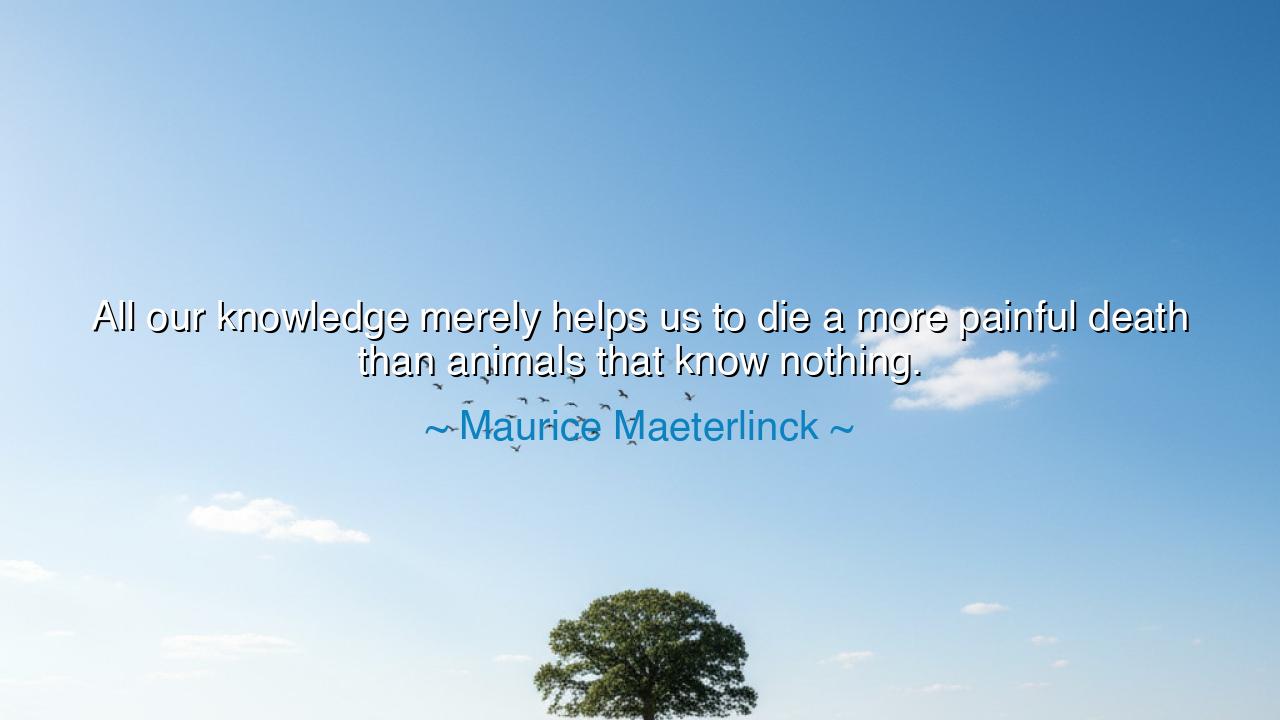
All our knowledge merely helps us to die a more painful death
All our knowledge merely helps us to die a more painful death than animals that know nothing.






“All our knowledge merely helps us to die a more painful death than animals that know nothing.” — Maurice Maeterlinck
In these somber yet luminous words, Maurice Maeterlinck, the Belgian mystic and playwright, speaks to the deepest paradox of the human condition — that knowledge, our greatest gift, is also our greatest burden. When he writes that our learning “helps us to die a more painful death,” he does not mock wisdom, but reveals its shadow. For what animals accept without fear — the inevitability of death — humanity contemplates endlessly. We have peered into the mysteries of existence, measured the stars, and mapped the body, yet we cannot still the trembling of the heart before the unknown. In knowing that we must die, we have gained awareness, but lost peace. Thus, Maeterlinck’s words echo across time as both lament and revelation: the more we see, the more we feel; the more we understand, the more we suffer.
Maeterlinck was not a cynic but a seeker — a man who wrestled with the invisible world. He belonged to an age when science was rising, faith was faltering, and the soul sought new ground to stand upon. His plays and essays, filled with silence, shadow, and mystery, explored the tension between wisdom and innocence. This quote springs from that search. He saw that while knowledge can enlighten the mind, it also exposes the spirit to despair. The animal grazes in peace, unaware of the clock that measures its life. But man, who knows the ticking of time, must carry that awareness as both crown and cross. To know mortality is to bear the weight of eternity without the wings to escape it.
The ancients, too, pondered this dilemma. Adam and Eve, in the garden of Eden, ate the fruit of knowledge — and in that moment, paradise was lost. The story is not about disobedience alone, but about the birth of consciousness. Once they knew, they could no longer live in innocence. They discovered death, shame, and the fragility of joy. So it has been for all of humankind: to awaken is to suffer, yet also to see beauty more deeply. For only the one who knows death can truly cherish life. This, too, is hidden within Maeterlinck’s sorrowful wisdom — that pain and perception walk hand in hand, and that every truth we gain exacts a price.
Consider the story of Socrates, the philosopher condemned to death for teaching men to think. As he awaited the cup of hemlock, his friends wept, but he remained calm, reasoning about the immortality of the soul. His knowledge, his relentless pursuit of truth, led him to the threshold of death — yet he faced it without fear. And still, one can imagine the irony Maeterlinck saw in this: that it is precisely because Socrates understood life so deeply that his death carried greater weight. The ignorant may die without reflection, but the wise die twice — once in the mind, and once in the flesh.
In these words also lies a critique of the modern illusion of progress. Humanity gathers knowledge — of science, art, and power — believing it will deliver happiness. Yet with each discovery, new questions, anxieties, and hungers arise. We conquer disease and invent war. We extend life and lose meaning. Maeterlinck saw that knowledge, when divorced from wisdom, deepens our suffering rather than easing it. The animal dies in silence; man dies surrounded by machines that can prolong his pain. It is not knowledge that destroys us, but the loss of reverence — the forgetting that knowledge must serve life, not dominate it.
Yet, his words need not drive us to despair. For within this dark truth lies a secret flame: if knowledge sharpens pain, it also deepens compassion. The one who suffers consciously may still choose to love, to create, to understand. The burden of awareness can either crush us or refine us into something luminous. We cannot unlearn our knowledge, nor should we. But we can temper it with humility — the wisdom to accept the limits of our understanding and the mystery that remains. To know and still find peace: that is the highest art.
Lesson:
From Maurice Maeterlinck’s solemn reflection, let us learn this: that knowledge is a double-edged gift. Seek truth, but do not worship it without heart. Let understanding be softened by wonder, and intellect by grace. Do not fear that awareness brings sorrow; rather, use it to live more deeply, to cherish more tenderly, to forgive more freely. Remember, the animal knows nothing and dies once; the human being knows everything and may die a thousand times in thought — yet in those thousand deaths, there is also the chance for rebirth, for meaning, for transcendence. Thus, let knowledge not make your death more painful, but your life more profound.






AAdministratorAdministrator
Welcome, honored guests. Please leave a comment, we will respond soon